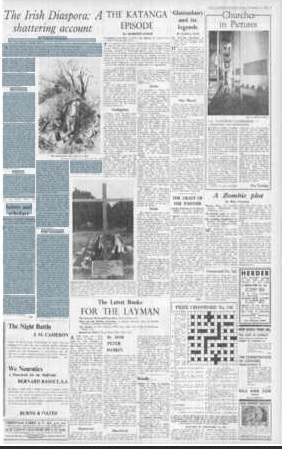|
Valentin Iremonger, review of The Great Hunger by Cecil Woodham-Smith
[Bibl. details: review of The Great Hunger, by Cecil Woodham-Smith, in Catholic Herald (16 Nov. 1962), p.13.
Catholic Herald Archives - online; accessed 13.0.2014. See page-image - infra.]
“A conquered people whom the victors delighted to trample upon. [... A] set of people who were looked upon as enemies to God and man and, indeed. as a race of savages who were a disgrace to human nature itself,” is how Edmund Burke described the lot of the miserable mass of his fellow-countrymen at the end of the eighteenth century.
He was not alive when the Great Famine. the worst of its kind recorded in European history in a time of peace, made the conditions under which the Irish had hitherto lived look like a vision of Paradise.
Michael Shaughnessy, the Assistant Barrister (a Crown appointment) in Mayo looked around him in 1849 and asked himself: “Am I in a civilised country and part of the British Empire?”
|
| |
| Uncivilised |
By the time the ines[cap]able epidemic swept the country in that year, even the Viceroy had become frantic: I don’t think there is another legislature in Europe that would disregard such suffering as how exists in the west of Ireland nor coldly persist in a policy of extermination, he wrote to Lord John Russell. But even the Viceroy’s fighting words achieved little against the “obtuseness. short-sightedness and ignorance” of the administration in Whitehall.
Indeed, the officials in Ireland who were in contact with the situation from 1845 lost no opportunity of putting forward their views as to how the position could he relieved; but all the time they ran up against the unyielding figure of Sir Charles Trevelyan, the permanent head of the Treasury and the epitome of the fanatical faith of mid-nineteenth century British politicians in the economic doctrine of laissez-faire - no interference by the Government, no meddling with “the operation of natural causes.” Trevelyan worked himself to a standstill explaining to all those who, from Ireland,implored him to do something exactly why he would do nothing to feed the people.
|
| |
| Political |
Benjamin Jewett, the famous Master of Balliol, remarked: “I have always had a horror of political economists since I heard one of them say that he feared the famine of 1848 in Ireland would not kill more than a million people and that would scarcely be enough lo do much good”.
The political economist in quesion was Nassau Senior, the the Government adviser on economic affairs. He would be sacked today for such an under-estimate: up to two million people died and another million emigrated by 1851. Most of the emigrants who reached England survived but the bulk went on the coffin ships to Canada so cheaply provided by the Ciovernment that an official said that if a tombstone to each emigrant who died at sea could be erected in the Atlantic, the route to America would be the greatest cemetery in the world.
A sizeable proportion of those who survived the terrible voyages died on the stone jetties and wharves of Canada. Among those who so died was the wife of John Ford, a sturdy Cork farmer, whose grandson established his first European motor plant in Cork.
The Irish-Americans have long memories and I commend this authoritative book to Mr. Evelyn Waugh who complained about them some years ago as “dragging with them their ancient rancours and the melancholy of the bogs”. they had cause to.
|
| |
| Folk memories |
I grew up myself on scattered tales of the famine retailed from the childhood memories of my grandmother who was born in those years but, with the scepticism of my generation, I regarded them as inaccurate folk-memories and, indeed, as ultra-nationalist propaganda. The full horror of those years has only now become clear to me in Mrs. Woodham-Smith’s majestic volume, documented as it is in the main from the writings of the officials caught up in the machinery of the Irish diaspora.
The details she gives of starvation, evictions. and exile are harrowing in the extreme, and one can only marvel that the millions who bore these sufferings emerged from them with their faith stronger than ever both at home and abroad. The descendants of those who found a reluctant refuge in Britain form today the major portion of the Catholic population here, while those who found a haven in America have now given the first Catholic President to the United States.
I cannot praise too highly this book upon which so much care has been lavished over such a long period of years.
We have admired Mrs. Woodham-Smith’s previous books on Florence Nightingale and on the Light Brigade: but this volume on the Irish famine will be her enduring monument. It is a shattering book and one that will keep you awake at night shivering as you read and re-read the almost unbelievable. but which, as late as the 19th century, actually happened.
|
| |
|
|
